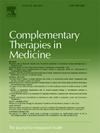Multidimensional factors associated with treatment adherence in Type II diabetes: The roles of spiritual well-being and mindfulness
IF 3.5
3区 医学
Q1 INTEGRATIVE & COMPLEMENTARY MEDICINE
引用次数: 0
Abstract
Background and purpose
Type II Diabetes Mellitus (DM) is a multifaceted, chronic metabolic condition requiring persistent adherence to treatment for effective management. Previous research has largely emphasized medical and behavioral determinants of adherence, while psychological and spiritual factors remain underexplored. Addressing this gap, the present study examines multidimensional factors associated with treatment adherence among individuals with Type II DM, within the framework of the Multidimensional Adherence Model (MAM), with a particular focus on the roles of mindfulness and spiritual well-being.
Materials and methods
A cross-sectional design was employed, involving 125 patients with Type II DM. Data were collected based on five dimensions within the MAM framework. The study utilized validated instruments, including the Patient Information Form, Mindful Attention Awareness Scale, Functional Assessment of Chronic Illness Therapy–Spiritual Well-Being Scale, Treatment Adherence in Type II DM Scale. The data were analysed using descriptive and correlational statistics and structural equation modelling. In this hypothesized model, the independent variable was mindfulness, the mediator was spiritual well-being, and the dependent variable was treatment adherence.
Results
Treatment adherence was significantly related to patient-related, socio-economic, healthcare system, and condition-related factors. Higher levels of mindfulness and spiritual well-being were positively associated with improved adherence behaviors. Notably, spiritual well-being demonstrated statistically significant indirect association in the link between mindfulness and treatment adherence.
Conclusion
This study highlights the need for a patient-centered approach to Type II DM care, integrating psychological and spiritual dimensions alongside medical management. Mindfulness and spiritual well-being emerged as key correlates of adherence, emphasizing the importance of holistic care in diabetes treatment.
与II型糖尿病治疗依从性相关的多维因素:精神健康和正念的作用。
背景和目的:2型糖尿病(DM)是一种多方面的慢性代谢疾病,需要持续坚持治疗才能有效管理。先前的研究主要强调坚持的医学和行为决定因素,而心理和精神因素仍未得到充分探索。为了解决这一差距,本研究在多维依从性模型(MAM)的框架内研究了与II型糖尿病患者治疗依从性相关的多维因素,特别关注正念和精神健康的作用。材料和方法:采用横断面设计,纳入125例II型糖尿病患者。数据收集基于MAM框架内的五个维度。本研究采用经验证的工具,包括患者信息表、正念注意意识量表、慢性疾病治疗功能评估-精神幸福感量表、II型糖尿病治疗依从性量表。使用描述性统计和相关统计以及结构方程模型对数据进行分析。在此假设模型中,自变量为正念,中介变量为精神幸福感,因变量为治疗依从性。结果:治疗依从性与患者相关因素、社会经济因素、医疗系统因素和病情相关因素显著相关。更高水平的正念和精神健康与改善的坚持行为呈正相关。值得注意的是,精神幸福感在正念和治疗依从性之间的联系中显示出统计上显著的间接关联。结论:本研究强调需要以患者为中心的方法来治疗II型糖尿病,将心理和精神层面与医疗管理结合起来。正念和精神健康是依从性的关键相关因素,强调了糖尿病治疗中整体护理的重要性。
本文章由计算机程序翻译,如有差异,请以英文原文为准。
求助全文
约1分钟内获得全文
求助全文
来源期刊

Complementary therapies in medicine
医学-全科医学与补充医学
CiteScore
8.60
自引率
2.80%
发文量
101
审稿时长
112 days
期刊介绍:
Complementary Therapies in Medicine is an international, peer-reviewed journal that has considerable appeal to anyone who seeks objective and critical information on complementary therapies or who wishes to deepen their understanding of these approaches. It will be of particular interest to healthcare practitioners including family practitioners, complementary therapists, nurses, and physiotherapists; to academics including social scientists and CAM researchers; to healthcare managers; and to patients. Complementary Therapies in Medicine aims to publish valid, relevant and rigorous research and serious discussion articles with the main purpose of improving healthcare.
 求助内容:
求助内容: 应助结果提醒方式:
应助结果提醒方式:


